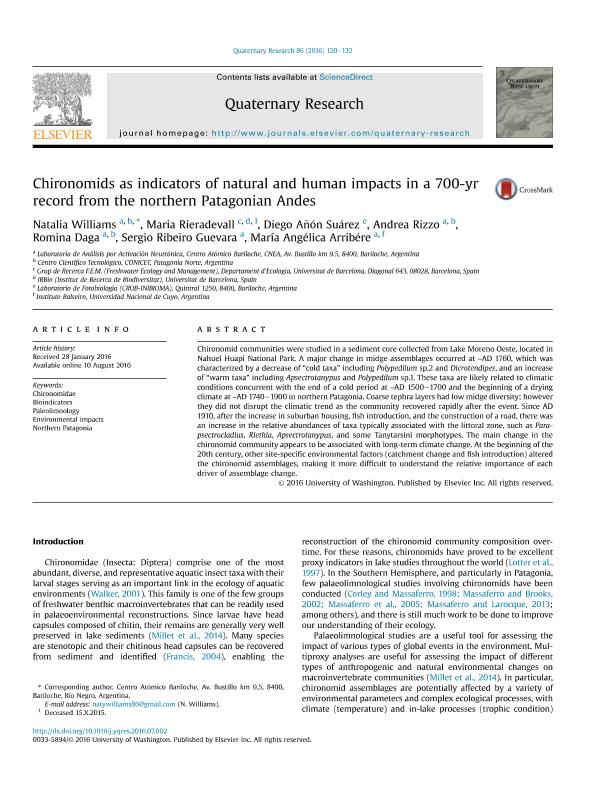Artículo
Chironomids as indicators of natural and human impacts in a 700-yr record from the northern Patagonian Andes
Williams Velázquez, Natalia Noemi ; Rieradevall, Maria; Añón Suárez, Diego Alejandro; Rizzo, Andrea Paula
; Rieradevall, Maria; Añón Suárez, Diego Alejandro; Rizzo, Andrea Paula ; Daga, Romina Betiana
; Daga, Romina Betiana ; Ribeiro Guevara, Sergio; Arribere, Maria Angelica
; Ribeiro Guevara, Sergio; Arribere, Maria Angelica
 ; Rieradevall, Maria; Añón Suárez, Diego Alejandro; Rizzo, Andrea Paula
; Rieradevall, Maria; Añón Suárez, Diego Alejandro; Rizzo, Andrea Paula ; Daga, Romina Betiana
; Daga, Romina Betiana ; Ribeiro Guevara, Sergio; Arribere, Maria Angelica
; Ribeiro Guevara, Sergio; Arribere, Maria Angelica
Fecha de publicación:
20/09/2016
Editorial:
Academic Press Inc Elsevier Science
Revista:
Quaternary Research
ISSN:
0033-5894
Idioma:
Inglés
Tipo de recurso:
Artículo publicado
Clasificación temática:
Resumen
Chironomid communities were studied in a sediment core collected from Lake Moreno Oeste, located in Nahuel Huapi National Park. A major change in midge assemblages occurred at ∼AD 1760, which was characterized by a decrease of “cold taxa” including Polypedilum sp.2 and Dicrotendipes, and an increase of “warm taxa” including Apsectrotanypus and Polypedilum sp.1. These taxa are likely related to climatic conditions concurrent with the end of a cold period at ∼AD 1500–1700 and the beginning of a drying climate at ∼AD 1740–1900 in northern Patagonia. Coarse tephra layers had low midge diversity; however they did not disrupt the climatic trend as the community recovered rapidly after the event. Since AD 1910, after the increase in suburban housing, fish introduction, and the construction of a road, there was an increase in the relative abundances of taxa typically associated with the littoral zone, such as Parapsectrocladius, Riethia, Apsectrotanypus, and some Tanytarsini morphotypes. The main change in the chironomid community appears to be associated with long-term climate change. At the beginning of the 20th century, other site-specific environmental factors (catchment change and fish introduction) altered the chironomid assemblages, making it more difficult to understand the relative importance of each driver of assemblage change.
Archivos asociados
Licencia
Identificadores
Colecciones
Articulos(CCT - PATAGONIA NORTE)
Articulos de CTRO.CIENTIFICO TECNOL.CONICET - PATAGONIA NORTE
Articulos de CTRO.CIENTIFICO TECNOL.CONICET - PATAGONIA NORTE
Articulos(INIBIOMA)
Articulos de INST. DE INVEST.EN BIODIVERSIDAD Y MEDIOAMBIENTE
Articulos de INST. DE INVEST.EN BIODIVERSIDAD Y MEDIOAMBIENTE
Citación
Williams Velázquez, Natalia Noemi; Rieradevall, Maria; Añón Suárez, Diego Alejandro; Rizzo, Andrea Paula; Daga, Romina Betiana; et al.; Chironomids as indicators of natural and human impacts in a 700-yr record from the northern Patagonian Andes; Academic Press Inc Elsevier Science; Quaternary Research; 86; 2; 20-9-2016; 120-132
Compartir
Altmétricas



